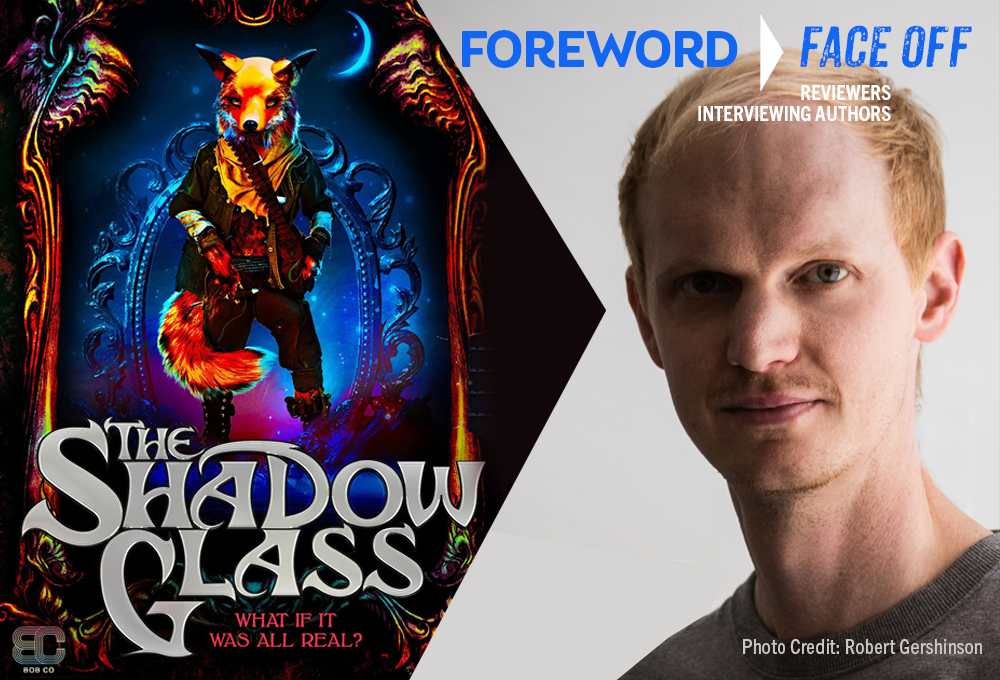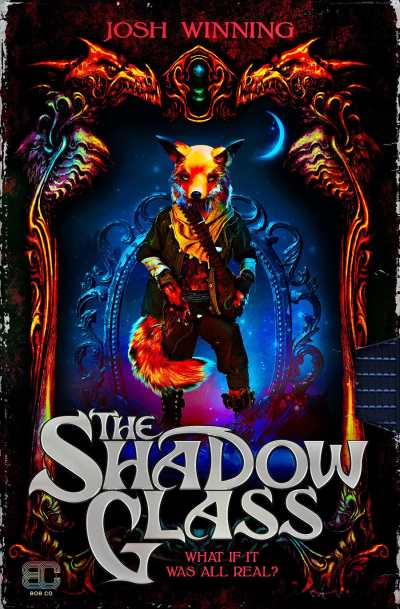Reviewer Eileen Gonzalez Interviews Josh Winning, Author of The Shadow Glass

You might get the idea that we don’t like flights of fantasy when we choose Foreword This Week interviews, but that’s not the case—writers like this week’s guest, Josh Winning, just don’t come along very often.

Take Eileen Gonzalez’s word for it. In her starred review, she calls Josh’s latest fantasy novel, The Shadow Glass, a “once in a lifetime adventure,” that culminates in a conclusion that will “satisfy anyone who has ever fallen in love with a story.” Wethinks this book may see a long, happy life on the bestseller lists.
To revel in Josh’s breathtaking imagination and storytelling skills, let’s all eavesdrop on their fantastical conversation.
The entire story is steeped in nostalgia: The Shadow Glass is a fictional ‘80s cult classic; there’s a scene at a fan convention and another at a VHS rental store, and the entire plot hinges on knowing obscure pop culture trivia and re-falling in love with favorite movies from childhood. Was there one particular movie or franchise that inspired you as you were writing, or was it a combination of different properties that are/were important to you?
More than anything, I was inspired by the memory of how films like The NeverEnding Story and Labyrinth made me feel as a kid. Those films are more complex and interesting than they were given credit for at the time, and they had a profound effect on me growing up. They delved into real darkness and deep philosophical issues, while never talking down to a young audience. They really hold up, decades later. The Shadow Glass is intended as a celebration of their quirkiness and emotional honesty, plus a chance for me to remind people why they should love ’80s puppet fantasy films.
You’ve done a lot of writing for nonfiction, media-related publications like Total Film and Den of Geek. Did your experiences with these outlets inspire or otherwise influence the book in any way?
Definitely. I have been lucky enough to visit the sets of films such as Muppets Most Wanted and 300: Rise of an Empire, and those experiences really informed the peek-behind-the-curtain aspects of The Shadow Glass. Working as a journalist also helped me improve as a writer. I’ve had the opportunity to write all sorts of pieces, from news stories and interview features to listicles and beyond. That really helped me while writing the “found documents” in the book (particularly the magazine articles, transcripts, and script pages), which I had a ball creating.
The world of Iri is so richly detailed and developed, it really feels like the bits and pieces of it revealed in the book are just the tip of the iceberg. Can you explain your world-building process a little? How did you come up with concepts like the Shadow Glass and all the various creatures, and how did you fit them together into a coherent world?
I find world-building a really fun, if intimidating, challenge. I think it’s important to take the time to really examine a world before you start writing, so, with The Shadow Glass, I spent six months brainstorming in a notebook, coming up with creatures and characters, figuring out the reality of the world of Iri. A big part of that was defining what mythological artifacts like the Shadow Glass actually do—I ended up linking it to the hero’s emotional journey, so that all roads lead back to Jack. Ultimately, I wanted to strike a balance between paying homage to some of my favorite movies and bringing my own thing to the table. As for fitting that all together into a coherent world, I’ll let readers be the judge of that!
One of the main villains, Wesley Cutter, closely resembles the internet’s more rabid fandom trolls: he is obsessed with keeping The Shadow Glass “pure” and goes to extraordinary measures to discount and discredit any changes or additions to the franchise. What made you include such a villain in your story?
Because of the nature of the story, which focuses on the mythology that has emerged around the movie The Shadow Glass, fandom quickly became a key theme in the book. It just seemed right thematically that if a key “fanboy” character is a good guy, then he must have an opposite number who represents the ways that fandom can go wrong. I’ve been an active participant in a handful of fandoms, and I have encountered fans who just never seem to be happy with what’s going on with their favorite IP. It seemed like fertile ground to explore!
Building on the last question, the fans who are carrying on The Shadow Glass legacy and fandom are a diverse bunch. Toby, for example, who is arguably the most important of the fans Jack meets, is Black and in a relationship with another (fan)boy. Was this a deliberate choice on your part? Was there anything you wanted to convey with this (for lack of a better word) casting?
Diversity and representation are very important to me—as a gay author, I want to see myself represented in all kinds of fiction, whether that’s in books or on the screen. That kind of visibility just wasn’t around when I was growing up, and I craved it on a deep level. I think that craving is always in the back of my mind when I’m breaking a story. Characters like Toby and the Guild popped into my head fully formed right from the start, and I would hope that they are representative of the kind of people I love and admire who don’t often get to be heroes in these sorts of stories.
There are several themes that could be interpreted as the book’s ultimate message. For example, there is the fact that fans influence and are influenced by the franchises they love, and there is the way Jack struggles with his evolving feelings for The Shadow Glass because of the memories he associates with it. What message or messages would you most like readers to take with them as they navigate their own fandoms?
This is a great question, although I’m hesitant to suggest readers take anything specifically from the book! I guess a key message is this: positivity is creative and unifying, negativity is destructive and isolating. I think that, these days, so much energy is spent attempting to put out virtual fires created by the more antagonistic people who exist online. Really, we should be ignoring them. Use your energy to more positive ends. You can love something quietly, or loudly, and that’s absolutely fine. You don’t have to justify it to anybody. Simply by loving something, you are doing good in this world.
Eileen Gonzalez
